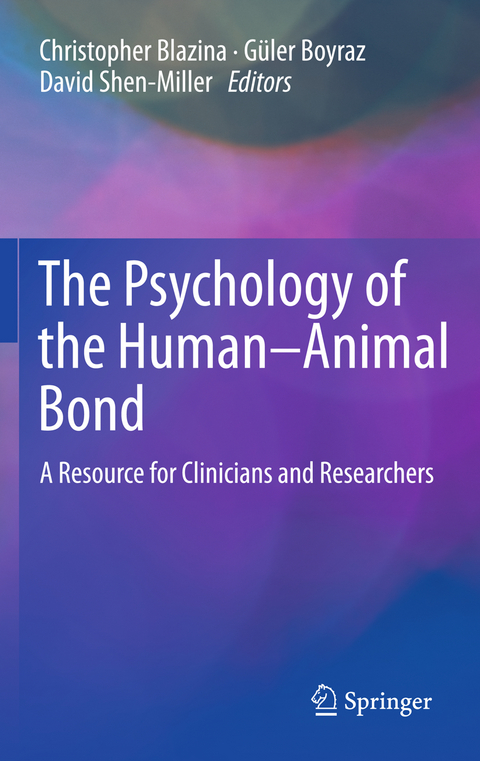
The Psychology of the Human-Animal Bond
Springer-Verlag New York Inc.
978-1-4614-6196-8 (ISBN)
Christopher Blazina, Ph.D. is a licensed psychologist, researcher, and professor of psychology. He received his doctorate in counseling psychology from the University of North Texas. He has been a faculty member at the University of Houston and Tennessee State University, training graduate students to become counselors and psychologists. Currently, he is a professor of psychology at Tennessee State University. The author of more than thirty articles and three books, Dr. Blazina has presented his recent research on the human-animal bond at conferences that include the American Psychological Association. David S. Shen-Miller, Ph.D. received his doctorate in counseling psychology from the University of Oregon. He is an assistant professor at Tennessee State University in the counseling psychology program and also engages in individual, couples, and group counseling and psychological testing. He has authored peer reviewed articles, book chapters, and more than 30 regional, national, and international presentations. He is a co-editor with Dr. Chris Blazina on the upcoming book An International Psychology of Men: Theoretical Advances, Case Studies, and Clinical Innovations, scheduled to be published by Routledge Press in 2010.Guler Boyraz, Ph.D. received her doctorate in counseling psychology from the University of Memphis. She is an assistant professor of counseling psychology at Tennessee State University. Her research focuses on attachment and loss, psychological resilience in the face of adverse life events, and gender roles and relationships across different cultures. In addition to the research awards she received during her doctoral training, she was awarded the Burl Gilliland Award for an outstanding doctoral student for two years in a row. She has published journal and newsletter articles, technical reports, and more than 25 peer-reviewed presentations.
Introduction: Using Context to Inform Clinical Practice and Research.- PART I: Contextual and Cultural Issues.- Chapter 1. British Animal Behavior Studies in the Twentieth Century: Interdisciplinary Perspectives.- Chapter 2. History of Animal Ethics in Western Culture.- Chapter 3. Ecosystemic and Cultural Impacts of Animal Introduction into Human Society in North America.- Chapter 4. Predator/Prey Relationships: What Humans Can Learn from Horses About Being Whole.- Chapter 5. Lap-Dogs and Moral Shepherd's Dogs: Canine and Paid Female Companions in Nineteenth Century English Literature.- PART II: Psychological Issues of Attachment.- Chapter 6. Self Psychology and the Human-Animal Bond: An Overview.- Chapter 7. Attachment Between Man and Animal: What Does It Mean?.- Chapter 8. A Developmental Psychological Perspective on the Human-Animal Bond.- Chapter 9. Understanding the AAT Rx: Applications of AAI in Clinical Practice .- Chapter 10. Attachment Style and Grief: An Internal Working Model Guiding Reactions to the Loss of a Pet Companion.- PART III: Positive Sway on Psychological Well-Being and Recovery from Illness.- Chapter 11. How Family Pets Keep Us Happier and Healthier: An Attachment Perspective on the Human-Animal Bond.- Chapter 12. Pet Ownership and Health.- PART IV: Bereavement, Loss, and Disenfranchised Grief.- Chapter 13. Family-Present Euthanasia: Protocols for Planning and Preparing Clients.- Chapter 14. Pet Loss.- Chapter 15. Death of a Companion Animal: Understanding Human Responses to Bereavement.- PART V: Animal Rights, Abuse, and Neglect.- Chapter 16. Urbanization and Animal Cruelty: What Role Does Utilitarianism Play?.- Chapter 17. Broken Bonds: Understanding the Experience of Pet Abandonment.- Chapter 18. Children and Adolescents who are Kind to Animals.- Chapter 19. Sentimentality in the Animal Rights Movement.- Chapter 20. Abusing the Human-Animal Bond: On the Making of Fighting Dogs.- Chapter 21. A Triad of Family Violence: Examining the Overlap in the Abuse of Children, Partners, and Pets.- PART VI: Tests, Measurements, and Current Research Issues.- Chapter 22. Qualitative Directions in Human-Animal Companion Research.- Chapter 23. The Pet Attitude Scale .- Chapter 24. Human Animal Research: Challenges and Future Directions.
| Zusatzinfo | XXII, 421 p. |
|---|---|
| Verlagsort | New York, NY |
| Sprache | englisch |
| Maße | 155 x 235 mm |
| Themenwelt | Geisteswissenschaften ► Psychologie ► Klinische Psychologie |
| Geisteswissenschaften ► Psychologie ► Sozialpsychologie | |
| Medizin / Pharmazie ► Medizinische Fachgebiete ► Psychiatrie / Psychotherapie | |
| Medizin / Pharmazie ► Physiotherapie / Ergotherapie ► Rehabilitation | |
| Naturwissenschaften ► Geowissenschaften ► Geografie / Kartografie | |
| Sozialwissenschaften ► Pädagogik ► Sozialpädagogik | |
| Sozialwissenschaften ► Soziologie | |
| Schlagworte | Animal-assisted therapy • animal behavior • Animal ethics • Animal interventions • animal rights • Attachment and loss • Canine companions • Human-animal bond • Human-animal relationship • Mensch-Tier-Beziehungen • Pet abandonment • Pet Attitude Scale • Pet companions • Pets |
| ISBN-10 | 1-4614-6196-0 / 1461461960 |
| ISBN-13 | 978-1-4614-6196-8 / 9781461461968 |
| Zustand | Neuware |
| Haben Sie eine Frage zum Produkt? |
aus dem Bereich


